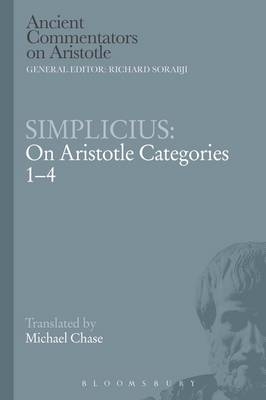
Simplicius: On Aristotle Categories 1-4
Seiten
2014
Bloomsbury Academic (Verlag)
978-1-4725-5738-4 (ISBN)
Bloomsbury Academic (Verlag)
978-1-4725-5738-4 (ISBN)
In his "Categories", Aristotle divides what exists in the sensible world into ten categories. This text provides a translation of Simplicius' commentary on "Categories" and represents over 600 years of criticism.
Simplicius' commentary on Aristotle's Categories is the most comprehensive philosophical critique of the work ever written, representing 600 years of criticism. In his Categories, Aristotle divides what exists in the sensible world into ten categories of Substance, Quantity, Relative, Quality and so on. Simplicius starts with a survey of previous commentators, and an introductory set of questions about Aristotle's philosophy and about the Categories in particular. The commentator, he says, needs to present Plato and Aristotle as in harmony on most things. Why are precisely ten categories named, given that Plato did with fewer distinctions? We have a survey of views on this. And where in the scheme of categories would one fit a quality that defines a substance - under substance or under quality? In his own commentary, Porphyry suggested classifying a defining quality as something distinct, a substantial quality, but others objected that this would constitute an eleventh. The most persistent question dealt with here is whether the categories classify words, concepts, or things.
Simplicius' commentary on Aristotle's Categories is the most comprehensive philosophical critique of the work ever written, representing 600 years of criticism. In his Categories, Aristotle divides what exists in the sensible world into ten categories of Substance, Quantity, Relative, Quality and so on. Simplicius starts with a survey of previous commentators, and an introductory set of questions about Aristotle's philosophy and about the Categories in particular. The commentator, he says, needs to present Plato and Aristotle as in harmony on most things. Why are precisely ten categories named, given that Plato did with fewer distinctions? We have a survey of views on this. And where in the scheme of categories would one fit a quality that defines a substance - under substance or under quality? In his own commentary, Porphyry suggested classifying a defining quality as something distinct, a substantial quality, but others objected that this would constitute an eleventh. The most persistent question dealt with here is whether the categories classify words, concepts, or things.
Dr Michael Chase is Assistant Editor at L'Annee Philologique and Research Engineer at the National Centre of Scientific Research, Paris, France.
Preface
Introduction
Textual Emendations
TRANSLATION
Notes
Bibliography English-Greek
Glossary Greek-English Index
Index of Passages Cited
Subject
Index
| Erscheint lt. Verlag | 10.4.2014 |
|---|---|
| Reihe/Serie | Ancient Commentators on Aristotle |
| Übersetzer | Dr Michael Chase |
| Verlagsort | London |
| Sprache | englisch |
| Maße | 156 x 234 mm |
| Gewicht | 290 g |
| Themenwelt | Geisteswissenschaften ► Philosophie ► Logik |
| Geisteswissenschaften ► Philosophie ► Philosophie Altertum / Antike | |
| Geisteswissenschaften ► Sprach- / Literaturwissenschaft ► Anglistik / Amerikanistik | |
| ISBN-10 | 1-4725-5738-7 / 1472557387 |
| ISBN-13 | 978-1-4725-5738-4 / 9781472557384 |
| Zustand | Neuware |
| Informationen gemäß Produktsicherheitsverordnung (GPSR) | |
| Haben Sie eine Frage zum Produkt? |
Mehr entdecken
aus dem Bereich
aus dem Bereich
ein Gegenentwurf zum kurzfristigen Denken : so werden wir zu den …
Buch | Hardcover (2023)
REDLINE (Verlag)
18,00 €


